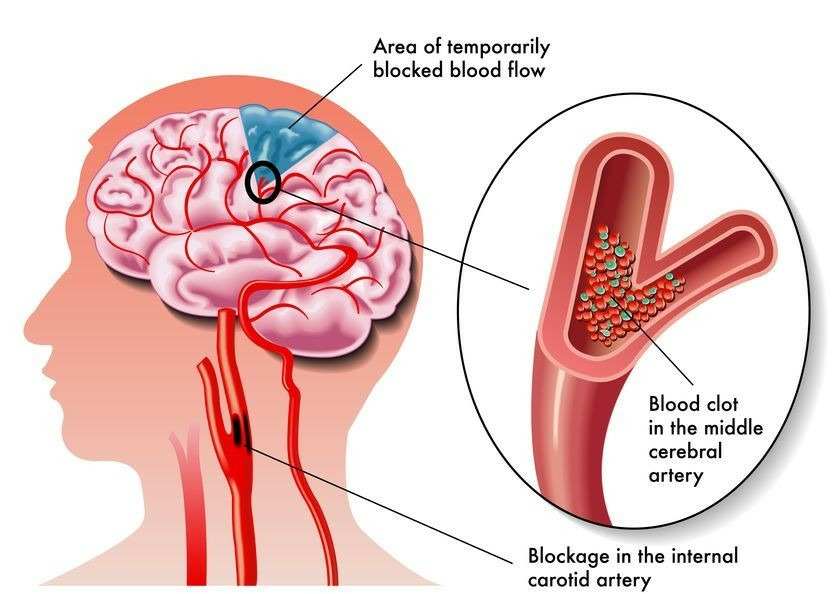Is there a cure for cerebral stroke?
What is a cerebral stroke?
As per modern aspect:
Cerebral stroke is the medical condition when the blood supply to part of your brain is reduced. This lack of blood supply results in the lack of oxygen or nutrients to the brain results in cell death. Blood flow could also be affected as a result of a ruptured artery. This is the most common medical issue that a healthy lifestyle can prevent it. Early treatment can minimize brain damage and other complications.

What are the different types of cerebral stroke?
These are the three main types of stroke:
- Ischemic stroke
- Transient stroke
- Hemorrhagic stroke
1. Ischemic stroke:
Ischemic stroke is the most common and occurs when a blood clot blocks the blood vessel and the arteries to the brain narrow or blocked. Blood clot occurs due to atherosclerosis which builds up the fatty deposits on the inner lining of the blood vessel. This causes a severely reduced of blood flow and oxygen to a part of the brain. This can happen in two ways.
2. Embolic stroke:
This stroke occurs when a clot forms somewhere else in the body and gets lodged in a blood vessel in the brain.
3. Hemorrhagic stroke:
This stroke occurs when a blood vessel ruptures or breaks which results in the spilling of blood into the surrounding tissues. Main types of hemorrhagic stroke are:
An aneurysm: This stroke causes a portion of the weakened blood vessel which results in outward blood flow and ruptures them.
Arteriovenous malformation: This stroke to abnormally formed blood vessels. A ruptured blood vessel causes a hemorrhagic stroke. High blood pressure can cause weakening of blood vessels in the brain and results in bleeding into the brain as well.
- Hereditary
- High blood pressure
- Increased smoking and alcohol consumption
- Cardiovascular diseases
- Uncontrolled diabetes
- High cholesterol level in the blood
- Obesity
What are the symptoms of cerebral stroke?
Symptoms include:
- Dizziness
- Difficulty in walking
- Loss of balance
- Difficulty in speaking
- Blurred vision
- Numbness in the leg, face, arm or on one side of the body
- Headache
- Vomiting
- Nausea
- Dizziness
- Muscle weakness
- Memory loss
- Altered consciousness
As per Ayurveda aspect:
Cerebral stroke is correlated with Pakshaghata which is a vata nanatmaja vyadhi considered as mahavatavyadhi. This occurs due to the vitiation of Vata dosha which controls the sensory and motor activities in the body. Pakshaghata means paralysis of one half of the body. There is an impairment of karmendriyas (which is considered as the part of the motor system), gyanendriyas (which is considered as the part of Sensory system) and manas (mind).
How to treat cerebral stroke naturally?
1. Cinnamon:
Extract of cinnamon can help in preventing brain cells from swelling and reduces complications related to cerebral stroke. This herb has a positive effect on the function of the brain. Thus it is helpful in protecting against a number of age-related neurological disorders. It also eases the stiffness of tendons, muscles, and ligaments and supports the easy movement of the joints. It plays a major role in proper functioning of brain.
2. Nutmeg:
Nutmeg contains an active compound called myristicin that can help in boosting the brain activity and keep it sharp. This herb improves the memory and also inhibits the functioning of an enzyme that contributes to Alzheimer’s disease. It also reduces fatigue and stress too. Oil of this herb promotes mental clarity and also relieves stress. Consume a pinch or two of freshly ground nutmeg in a day daily.
3. Black pepper:
Black pepper contains a pungent compound called piperine that increases the beta-endorphins in the brain and also boosts the cognitive function that improves the mood and promotes the feeling of relaxation. It strengthens the bones and joints.•
4. Holy basil:
Holy basil is considered as a powerful herb due to its various medicinal properties. This herb contains nerol, flavonoids, camphor, eugenol, and terpenes. The menthol extracts present in holy basil are useful in reducing brain damage due to the decreased cerebral circulation. This herb acts as a stress reliever by reducing the production of stress hormones. It enhances concentration and memory.
5. Clove:
Clove is used as a natural mental stimulant that decreases oxidative stress because it has antioxidant property. This herb also contains phenol compounds which are helpful in removing toxins from the body. It supports cellular health and stimulates the brain which makes you more energetic and attractive and maintains proper functioning of the brain.
6. Turmeric:
Turmeric contains an active chemical compound called curcumin that reduces the formation of blood clots in the brain which is linked to cerebral stroke. This herb slows down the progression of stroke due to its antioxidant property. It also has an antidepressant effect and improves memory. A recent study indicated that turmeric protects against alcohol-induced brain damage. It provides strength to the bones and joints.
7. Rosemary:
Rosemary has an antioxidant property that helps fight off free-radical damage in the brain. By its anti-inflammatory property, this herb reduces inflammation and pain. This herb contains carnosic acid which is good for protecting the brain from stroke and other neurodegenerative conditions. By its stimulating effect, stimulates the nerve growth and prevents nerve cell damage. It also improves brain functioning by increasing blood circulation in the brain.
8. Thyme:
Thyme is an effective herb for supporting brain health. This herb contains omega-3 fatty acids which are beneficial for the brain and protects against age-related cognitive decline or dementia. It also contains flavonoids that prevent the damage of cells caused by free radicals.
9. Sage (Ankol):
Sage contains carnosic acid that stops the free radical damage in the brain. This herb maintains the proper functioning of the brain and boosts the memory recall. It also increases the production of anti-aging antioxidants which are useful in treating a number of neurological disorders.

